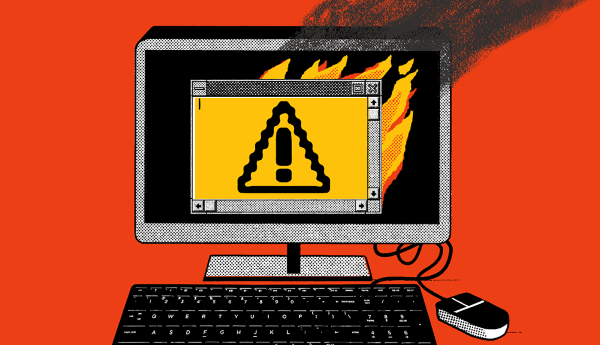Protect your PC from viruses and malware
Many of us are still working from home despite the Covid-19 lock down easing. When you were office-based your IT support team took care of data security measures for you, but now that you’re working from home you may need to do some IT support yourself. To make working from home more secure you need to protect your PC from viruses and malware, but how can you do that?
Keep your software up to date
Software makers like Microsoft and Apple regularly update their software to fix bugs that could potentially be exploited by hackers. So make sure that you run a check for software updates at least once per month, or better still turn on automatic updates.
Don’t click on links within emails
A good rule of thumb is if you don’t recognise the sender of an email, don’t click on any links within it or open any attachments it may have. Also if you receive an email from a known sender but were not expecting then again don’t click on any links within it or open any attachments it may have. Microsoft says 44.8 percent of Windows virus infections happen because the computer user clicked on something.
Use antivirus software
You don’t have to pay for software to protect your computer or for an annual subscription to maintain the latest virus protection. For Windows users, Microsoft Security Essentials is free. Avast is another free anti-virus program. The free versions are just as good as paid versions for helping you to protect your PC from viruses and malware.
Back up your computer
Do you regularly back up the information on your computer? If you don’t, and 29 percent of computer users fall into that category, you have no protection from disasters ranging from hard drive failure to theft and encrypting malware. If you value your data, back it up.
You have three basic backup options: an external hard drive, online backup service, or cloud storage. Use a service like Google Drive, and your files will be continually backed up to the cloud. And the price is right: free for up to 5 GB of data. For more, see Online Storage Wars: Which Virtual Storage Is Best?
Use a strong password
A strong password is one that is complex, with a mix of letters, numbers, and symbols. While some people use the same password for everything, try to avoid that practice.
Password security company SplashData.com says the three most common passwords are password, 123456, and 12345678. The company recommends avoiding using the same user name/password combination for multiple online site logins.
When creating a password, use eight characters or more and, to make them easier to remember, try using short phrases separated by spaces or underscore marks – such as “car_park_city?” or use a random password generator like one at Random.org.
There are also free services LastPass to create and manage your passwords. You only have to remember one password: the one that opens your LastPass vault. Once you’ve opened it, LastPass will automatically log you in to every site you visit requiring a password.
Use a firewall
Just because you have antivirus software running doesn’t mean you have a firewall. Both PCs and Macs come with built-in firewall software. To protect your PC from viruses and malware make sure that it’s enabled.
Minimise downloads
Make sure your Web browser’s security settings are high enough to detect unauthorised downloads. For Internet Explorer, the medium security setting is the minimum level to use.
Use a pop-up blocker
Web browsers have the ability to stop pop-up windows and allow you to set the security for accepting pop-ups. To protect your PC from viruses and malware make we recommend that you never clicking on links within pop-up screens.
If you have any questions about how to protect your PC from viruses and malware or any other computer-related questions, give us a call on 0345 319 4877 (local call rate). We’ll be happy to help you.















